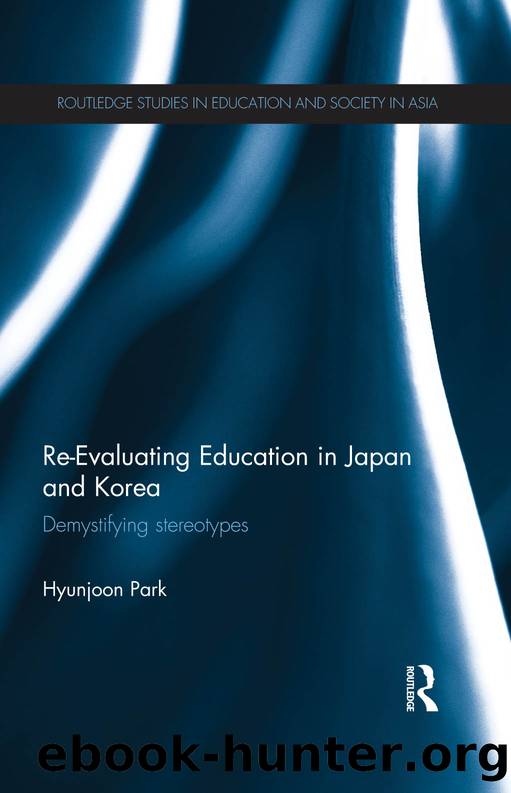Re-Evaluating Education in Japan and Korea by Park Hyunjoon;

Author:Park, Hyunjoon;
Language: eng
Format: epub
ISBN: 1207536
Publisher: Taylor & Francis Group
5 Demystifying the stereotype
Are high test scores of Japanese and Korean students due to âshadow educationâ?
It is well known that a large number of Japanese and Korean students take private supplementary education after regular school, including one-on-one or group private tutoring, private test preparation services, and cram schools. These out-of-school supplementary education activities are intended to help students master academic subjects on the school curricula, improve their academic performance, and ultimately obtain good scores on high-risk tests such as college entrance exams. Often referred to as âshadow education,â these activities âare organized, structured learning opportunities that resemble school-like processesâ (Baker and LeTendre 2005: 56; Stevenson and Baker 1992). According to Bray (2007), three major features characterize shadow education activities. First, these activities pertain to subjects that are already covered in formal schooling (supplementation). Second, shadow education is provided in exchange for a fee by private entrepreneurs and individuals (privateness). In this respect, shadow education activities concerned with Japanese and Korean studentsâ performance should be distinguished from extra tutoring provided by school teachers as part of their professional commitment and responsibility and other educational help offered by family or community members. Finally, the objective of shadow education activities is to boost studentsâ performance in academic subjects such as mathematics and languages that are major subjects of the formal school curricula and achievement tests. Therefore, musical, artistic, or sporting skills that are learned primarily for pleasure and for personal development are not included in shadow education.
Shadow education activities take place in various forms (Kim and Lee 2010; Park, Byun, and Kim 2011). Students can take individual (or small group) tutoring by private tutors. Students also work with self-study sheets regularly prepared and delivered by private companies. After finishing the selfstudy sheets, students submit the sheets to the companies and then they receive comments and instructions for further study from instructors hired by the companies. A growing number of students log in to a website to take online tutoring (Choe 2009). However, probably the most obvious and extreme form of shadow education in East Asia, which has received a lot of attention from Western journalists and educators, is for-profit cram schools where students are taught by instructors to master major school subjects such as language, mathematics, and English in classroom-like settings (juku in Japan, hagwon in Korea) (Park, Byun, and Kim 2011). Cram schools mimic formal schools in regard to curriculum, instruction, and exams. In other words, many Japanese and Korean students go to another kind of school after regular school for additional learning.
According to a national survey of private supplementary education conducted by the Korea National Statistical Office, three out of four primary and secondary students in Korea took at least one form of private supplementary education after school in 2009 (Statistics Korea 2010). The most common form of private supplementary education was attending a cram school, hagwon. A total of 22 trillion Korean won (approximately U.S.$20 billion) was spent by Korean families on private supplementary education in the same year. According
Download
This site does not store any files on its server. We only index and link to content provided by other sites. Please contact the content providers to delete copyright contents if any and email us, we'll remove relevant links or contents immediately.
The Art of Coaching Workbook by Elena Aguilar(50430)
Trainspotting by Irvine Welsh(21224)
Twilight of the Idols With the Antichrist and Ecce Homo by Friedrich Nietzsche(18389)
Fangirl by Rainbow Rowell(8890)
Periodization Training for Sports by Tudor Bompa(8008)
Change Your Questions, Change Your Life by Marilee Adams(7482)
This Is How You Lose Her by Junot Diaz(6572)
Asking the Right Questions: A Guide to Critical Thinking by M. Neil Browne & Stuart M. Keeley(5489)
Grit by Angela Duckworth(5380)
Red Sparrow by Jason Matthews(5277)
Paper Towns by Green John(4911)
Room 212 by Kate Stewart(4855)
Ken Follett - World without end by Ken Follett(4522)
Housekeeping by Marilynne Robinson(4155)
The Sports Rules Book by Human Kinetics(4153)
Double Down (Diary of a Wimpy Kid Book 11) by Jeff Kinney(4046)
Papillon (English) by Henri Charrière(4021)
The Motorcycle Diaries by Ernesto Che Guevara(3863)
Exercise Technique Manual for Resistance Training by National Strength & Conditioning Association(3857)
